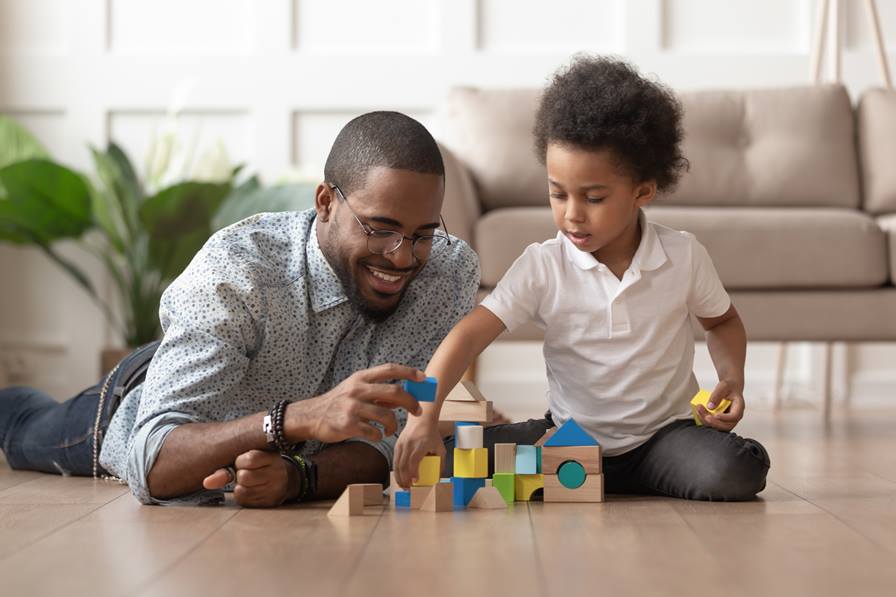
Fear, uncertainty, and being holed up at home to slow the spread of COVID-19 can make it tough for families to keep a sense of calm. But it’s important to help children feel safe, keep healthy routines, manage their behavior and build resilience.
Here are some tips from the American Academy (AAP) to help your family through the outbreak.
Address children’s fears
Children rely on their parents for safety, both physical and emotional. Reassure your children that you are there for them and that your family will get through this together.
- Answer questions about the pandemic simply & honestly. Talk with children about any frightening news they hear. It is OK to say people are getting sick, but say following rules like hand washing and staying home will help your family stay healthy.
- Recognize your child’s feelings. Calmly say, for example, “I can see that you are upset because you can’t have your friends over.” Guiding questions can help older children and teens work through issues. (“I know it is disappointing not to be able to hang with your friends right now. How do you think you can stay in touch with them?”)
- Keep in touch with loved ones. Children may also worry about a grandparent who is living alone or a relative or friend with an increased risk of getting COVID-19. Video chats can help ease their anxiety.
- Model how to manage feelings. Talk through how you are managing your own feelings. (“I am worried about Grandma since I can’t go visit her. The best I can do is to check in with her more often by phone. I will put a reminder on my phone to call her in the morning and the afternoon until this outbreak ends.”)
- Tell your child before you leave the house for work or essential errands. In a calm and reassuring voice, tell them where you are going, how long you will be gone, when you will return, and that you are taking steps to stay safe.
- Look forward. Tell them that scientists are working hard to figure out how to help people who get ill, and that things will get better.
- Offer extra hugs and say “I love you” more often.
Keep healthy routines
During the pandemic, it is more important than ever to maintain bedtime and other routines. They create a sense of order to the day that offers reassurance in a very uncertain time. All children, including teens, benefit from routines that are predictable yet flexible enough to meet individual needs.
- Structure the day. With the usual routines thrown off, establish new daily schedules. Break up schoolwork when possible. Older children and teens can help with schedules, but they should follow a general order, such as:
- wake-up routines, getting dressed, breakfast and some active play in the morning, followed by quiet play and snack to transition into schoolwork.
- lunch, chores, exercise, some online social time with friends, and then homework in the afternoon.
- family time & reading before bed.
A word about bedtimesChildren often have more trouble with bedtime during any stressful period. Try to keep normal nighttime routines such as Book, Brush, Bed for younger children. Put a family picture by their bed for “extra love” until morning. Bedtimes can shift some for older children and teens, but it is a good idea to keep it in a reasonable range so the sleep-wake cycle isn’t thrown off. Too little sleep makes it more challenging to learn and to deal with emotions. Remember to turn off cell phones and other mobile devices an hour before bedtime. |
|---|
Use positive discipline
Everyone is more anxious and worried during the pandemic. Younger children may not have the words to describe their feelings. They’re more likely to act out their stress, anxiety or fear through their behavior (which can, in turn, upset parents, particularly if they are already stressed). Older children and teens may be extra irritable as they miss out on time with friends and special events being cancelled.
Some ways you can help your children manage their emotions and behavior:
- Redirect bad behavior. Sometimes children misbehave because they are bored or don’t know any better. Find something else for them to do.
- Creative play. Suggest your children draw pictures of ways your family is staying safe. Make a collage and hang it up to remind everyone. Or, build an indoor fort or castle to keep the germs at bay, bringing in favorite stuffed animals or toys.
- Direct your attention. Attention–to reinforce good behaviors and discourage others–is a powerful tool. Notice good behavior and point it out, praising success and good tries. Explaining clear expectations, particularly with older children, can help with this.
- Use rewards & privileges to reinforce good behaviors (completing school assignments, chores, getting along with siblings, etc.) that wouldn’t normally be given during less stressful times.
- Know when not to respond. As long as your child isn’t doing something dangerous and gets attention for good behavior, ignoring bad behavior can be an effective way of stopping it.
- Use time-outs. This discipline tool works best by warning children they will get a time-out if they don’t stop. Remind them what they did wrong in as few words―and with as little emotion―as possible. Then, remove them from the situation for a pre-set length of time (1 minute per year of age is a good guide).
For the entire article go to: www.healthychildren.org










